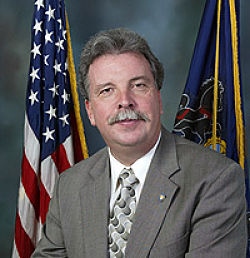
New Jersey Gambling License Renewal Deadline Approaching [...]

TRY THESE POPULAR GAMES:
- February 26, 2015 By Nemanja L. -

Pennsylvania Rep. John Payne hopes to see new gambling bill passed.
Pennsylvania have stepped up their efforts to fully regulate gambling in the state as Rep. John Payne presented a new online gambling bill.
The chairman of the House of Representatives Gaming Oversight Committee revealed his plans to decrease the expected $2 billion budget deficit with the help of improved online gaming revenue.
Payne’s HB 649 has yet to be made available for the general public, but a memo posted to the House of Representatives website claims the new legislation would ensure that online gaming is restricted to the state’s current gaming licenses.
Internet gaming revenue would be taxed at a fixed rate of 14 per cent, whereas each license would cost $5 million. The fact that “internet gaming” is used in the bill rather than “internet poker” is enough to suggest Pennsylvania will allow other forms of gambling, similar to New Jersey.
After a 2014 study tipped internet gambling to become the largest revenue source for the gaming industry, Payne said he hoped to see the market generate around $120 million in revenue in the first year alone.
The state representative is eager to see Pennsylvania beat neighbouring states of Ohio, Maryland and New York in opening to online casinos and online poker websites, with the hearing on the issue scheduled for 16th April.
The problem is that new state Governor Tom Wolf stated back in January that he would not support any expansion of the Pennsylvania casino industry, so chances are he won’t be too keen on the latest bill designed to allow online gambling.
Previous hearings on the issue did not go too well, with Las Vegas Sands, the parent company of Sands Bethlehem, the state’s leading land-based casino establishment, voicing strong opposition to the prospect of internet gaming.
Under the terms of the current gambling law, there are just 14 licenses issues to brick and mortar casinos, with seven operating within existing horse racing tracks, five issued to stand-alone casinos and another two part of famous hotel resorts.
As of 2010, the state’s casinos are also allowed to operate table games, up to 250 of them, while housing no more than 5,000 slot machines.